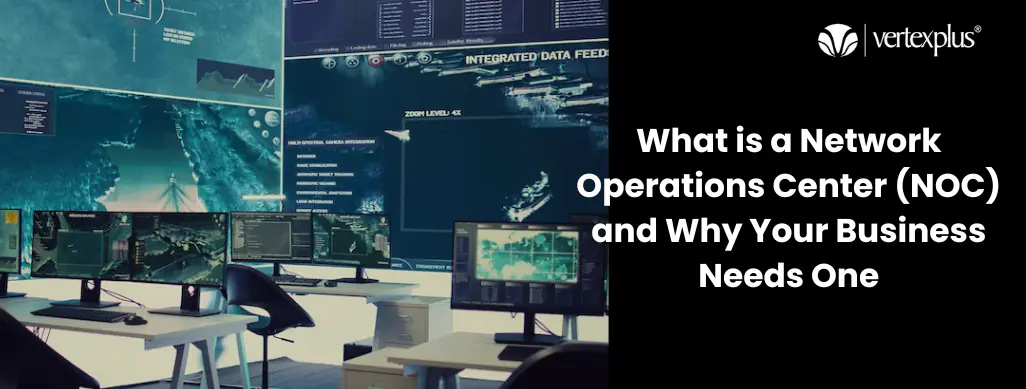
We use cookies to ensure that we give you the best experience on our website.
By using this site, you agree to our use of cookies. Find out more.

Is Your Business Ready for a Midnight IT Emergency?
Imagine it�s 2:30 AM. Your website crashes. Customers can�t access your services. Sales are halted. Your team is fast asleep, and your brand reputation is on the line. Who's watching over your network while you sleep? If your answer is no one, it might be time to understand the role of a network operations center and how it keeps your digital world running.
A Network Operations Center (NOC) is a centralized facility made up of skilled IT personnel with a view to watching over, managing, and maintaining an entire network infrastructure. But it is really like a digital watchdog for ensuring uptime and connectivity, performance issues, or threats to the correct running of its business.
Contrary to addressing existing issues, it aims to keep them away. NOCs work around the clock, proactively monitoring systems and spotting issues before they turn into major disruptions.
In general, the NOC works alongside help desks and security teams. The NOC stands broad and serves as the operational backbone for your IT ecosystem, which ensures that your services, platforms, and applications remain reliable and secure.
An operational network operations center will perform a vast range of functions that are imperative to maintain business continuity:
These functions, when supported by comprehensive IT solutions & consulting services, form a resilient, responsive IT environment.
For growing businesses and enterprises alike, having a network operations center offers several concrete advantages:
Immediate detection and resolution of technical issues means less disruption to your operations. Downtime costs money and trust; NOCs help minimize both.
With continuous monitoring, suspicious activities can be flagged and dealt with before data is compromised. This is especially important in industries handling sensitive customer information.
A NOC tracks performance trends and bottlenecks, allowing you to make data-backed improvements over time.
As your business grows, so do your IT demands. A NOC can scale alongside your operations, ensuring you remain efficient and agile.
With preventive maintenance, fewer outages, and reduced reactive efforts, an NOC reduces overall operational costs, especially when integrated with external IT solutions & consulting services.
Not every company thinks they need a network operations center, but many realize its importance only after experiencing a critical failure. Industries and businesses that benefit most include
Signs you need a NOC:
When deciding between building an internal team or partnering with a third-party provider, consider these factors:
Full control over systems and data
Custom processes tailored to internal goals
High upfront costs
Need for specialized IT staff and equipment
Difficult to provide true 24/7 coverage
Cost-effective with predictable pricing
Immediate access to experienced professionals
Scalable to match your business needs
Easier integration with IT solutions & Consulting Services
For most mid-sized businesses, outsourcing offers a more flexible and affordable way to gain round-the-clock IT resilience without the heavy internal lift.
In today�s digital-first world, waiting until something breaks is no longer an option. Whether you�re a startup scaling rapidly or a mature business modernizing your infrastructure, a network operations center helps you stay ahead by ensuring your IT backbone remains healthy, secure, and efficient.
When paired with robust IT solutions & consulting services, the NOC transforms from a behind-the-scenes function to a strategic asset. It�s not just about monitoring, it�s about growth, security, and staying competitive in a landscape where downtime isn�t just an inconvenience; it�s a threat to your business.
So, the next time your team logs off for the night, ask yourself, who�s watching your network while you sleep?
A Network Operations Center (NOC) is a centralized hub where IT teams monitor and manage a company�s network, servers, systems, and applications 24/7 to ensure they run smoothly and without disruption.
While IT support typically reacts to problems, a NOC works proactively. It continuously monitors systems, prevents issues, and ensures performance before anything goes wrong.
They keep an eye on network health, server uptime, application performance, security alerts, and system metrics. They also handle incident resolution and maintenance tasks.
Downtime can happen anytime, especially after office hours. With 24/7 monitoring, issues are caught and fixed immediately, minimizing disruption, loss, and customer frustration.
As your operations scale, so do your IT needs. A NOC supports growth by ensuring infrastructure remains stable, scalable, and responsive, without overwhelming internal teams.
Absolutely. Even small businesses face downtime risks and cyber threats. A NOC provides cost-effective, round-the-clock coverage and peace of mind without hiring a whole in-house team.
Outsourcing offers expert monitoring, fast response, and infrastructure management at a fraction of the cost of building an in-house team, plus access to additional IT solutions & consulting services.
Leave a Comment
Your email address will not be published.